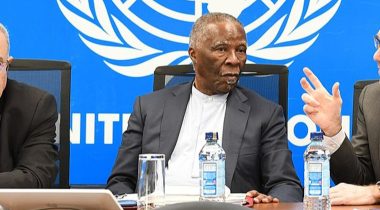
John Christensen ■ Open letter to G20 leaders – something must be done at Brisbane about illicit financial flows

OPEN LETTER TO
G20 LEADERS
When a global financial system allows billions of dollars of corrupt or stolen money to flow unchecked around the globe, something is wrong. When financial secrecy helps strip Africa of US$50 billion each year, something is wrong. When the poor of this world see the wealth of their countries slip beyond their borders, something must be done.
That’s our message to you, as G20 leaders: when you take stock in November of the health of the world’s financial system, you must address the flaws that still allow the corrupt to operate with impunity and siphon off tainted monies. In your drive to achieve a target of 2% collective growth in GDP above trend, you must remember that growth must be inclusive and sustainable and not leave anyone behind.
At the Brisbane Summit you must put people at the centre of your decision-making.
As long as there are places in the global financial system where illicit financial flows can find a safe harbour and there are people to help hide these funds there will be millions more around the world who suffer. You, the leaders of the world’s largest economies must make the global financial system serve its citizens.
At least one trillion dollars is siphoned from developing countries each year. The perpetrators of this “trillion dollar scandal” are rarely found, nor challenged.
The UN estimates that global detection rates of illicit funds by law enforcement are as low as 1 per cent. However, there are common-sense ways to make it harder for criminals to hide the proceeds of their crimes. You have already done some of the heavy lifting.
The G20 has declared that shedding light on corporate ownership is a priority. Today anonymous companies, secrecy jurisdictions and opaque corporate ownership structures represent the primary methods used by those who are corrupt or evading tax to shift their funds and mask their identity. G20 governments must collect and publish the identity of the real, living people who ultimately own and control companies and other legal entities to make it easier to track the origin of corrupt or illicit funds.
You as G20 leaders could take a bold step to unmask the corrupt by pledging to do this in Brisbane.
The G20 has agreed that profits should be taxed “where economic activities occur and value is created” to ensure that countries, especially developing countries, do not lose out on the wealth of their resources and the graft of their people. It is crucial that multinational companies are more transparent about their operations. They should publish information about revenue, profits, numbers of staff, tax liabilities and taxes paid on a country-by-country basis. This needs to be public for citizens to see the impact of companies in their communities and to make it easier to scrutinise where money is earned and where it may be going missing.
Opacity in the global financial system serves as a smokescreen to hide crime and corruption but the G20 has the opportunity to shine a light and make it harder to hide. Lest we forget: the primary victims of organized crime, corruption, and tax evasion or avoidance are the poorest citizens of the world. Put people at the heart of your decisions in Brisbane next week.
Signatories
1. Raymond W. Baker, President, Global Financial Integrity
2. Winnie Byanyima, Executive Director, Oxfam International
3. John Christensen, Executive Director, Tax Justice Network
4. Rev. Tim Costello, CEO, World Vision Australia and Chair of the Civil 20 (C20)
5. Jamie Drummond, Co-Founder, The ONE Campaign
6. Joel Edwards, International Director, Micah Challenge
7. Professor the Hon Gareth Evans AC QC, Chancellor, Australian National University
8. Matthew Frost, Chief Executive, Tearfund
9. John Githongo, CEO Inuka Kenya Nisisi Ltd, former Permanent Secretary, Governance and Ethics, Office of the President of Kenya
10. Robert Glasser, Secretary General, CARE International
11. Richard Goldstone, Retired Justice of the Constitutional Court of South Africa
12. Manzoor Hasan, Chair, UN Convention against Corruption (UNCAC) Coalition
13. Gavin Hayman, Executive Director, Global Witness
14. Tawakkol Karman, 2011 Nobel Peace Prize Laureate & Founder, Women Journalists Without Chains
15. Daniel Kaufmann, President, Natural Resource Governance Institute (NRGI)
16. Caroline Kende-Robb, Executive Director, Africa Progress Panel
17. Akaash Maharaj, Executive Director, Global Organization of Parliamentarians Against Corruption
18. Loretta Minghella, Chief Executive, Christian Aid
19. Alvin Mosioma, Chair, Financial Transparency Coalition
20. Archbishop Njongo Ndungane, President and Founder, African Monitor
21. Salil Shetty, Secretary General, Amnesty International
22. Oriana Suárez, Latin American Network on Debt, Development and Rights
23. Cobus de Swardt, Managing Director, Transparency International
24. Archbishop Desmond Tutu, 1984 Nobel Peace Prize Laureate and former Archbishop of Cape Town
25. Jasmine Whitbread, CEO, Save the Children
Related articles

Tax Justice transformational moments of 2024

The Tax Justice Network’s most read pieces of 2024

Did we really end offshore tax evasion?
The State of Tax Justice 2024

Indicator deep dive: Public country by country reporting
How ‘greenlaundering’ conceals the full scale of fossil fuel financing
11 September 2024

10 Ans Après, Le Souhait Du Rapport Mbeki Pour Des Négociations Fiscales A L’ONU Est Exaucé !

Another EU court case is weaponising human rights against transparency and tax justice
Submission to Special Rapporteur on the independence of judges and lawyers on undue influence of economic actors on judicial systems








